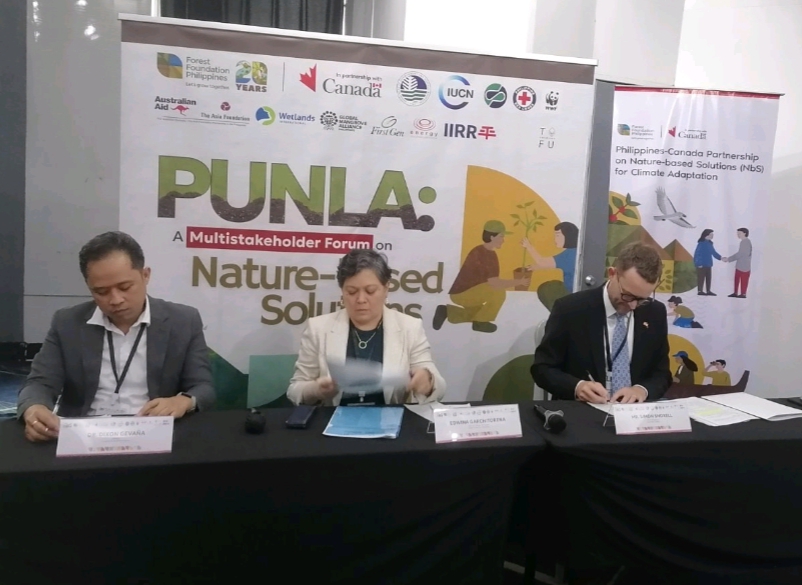By Perfecto T. Raymundo, Jr.
QUEZON CITY — The Department of Environment and Natural Resources (DENR), together with Forest Foundation Philippines in partnership with Global Affairs Canada, on Tuesday (Sept. 9) conducted PUNLA: A Multistakeholder Forum on Nature-based Solutions (NbS) — a gathering of experts, practitioners, and communities to advance the institutionalization of NbS in the Philippines.
The forum runs from Sept. 9-10 at the Hive Hotel & Convention Center.
As climate change deepens vulnerabilities in countries like the Philippines, NbS have emerged globally as cost-effective, holistic solutions that address interconnected social and environmental challenges — from food and water security to disaster risk reduction.
While NbS is not new to the Philippines, the need for a shared understanding, national definition, and stronger collaboration has never been more urgent.
The Forum showcased good practices on NbS in the Philippines.
Building on 20 years of experience, Forest Foundation Philippines and its partners, through the Philippines-Canada Partnership on NbS for Climate Adaptation (PCP4NbS), are driving collaboration for forest protection, climate action, and inclusive NbS pathways.
Atty. Ray Thomas F. Kabigting, Assistant Director of Forest Management Bureau of DENR, said that most of the problems on flooding is nature-based.
Simon Snoxell, Head of Cooperation of Embassy of Canada, in his message of support, said that he has visited the Biodiversity Center in UP Los Banos.
“Filipinos take their nature very seriously,” Snoxell said.
“We have many UNESCO Heritage Sites,” he added.
Snoxell cited that many sponsors are participating in today’s event.
He congratulated the DENR, Forest Foundation Philippines, UP Los Banos, the Philippine Red Cross, among others.
Dr. Dixon Gevana, Director of Forestry Development Center of University of the Philippines Los Banos, said “We are thankful that we are part of this group, the Technical Working Group.”
Dr. Gevana added that one of the works of the TWGs is finding the solutions to problems.
“In this forum, we really need to have a grasp of the priority problems that we need to solve,” Dr. Gevana said.
He said that the forum aims to develop a shared understanding of NbS among stakeholders.
Jake Browner, of IUCN, cited the use of canal in removing flooding.
Without saying that investment in drainage is necessary, Browner said, such a drainage canal helps draining the paddies during the rainy season.
He also cited the Mekong Delta-based crops in Vietnam.
“We succeed with World Bank in our work with Mekong Delta,” Browner said.
“It’s the thousands of people downstream who don’t anymore need to spend thousands of dollars in draining activities,” he added.
Browner noted that Vietnam is the no. 2 exporter of coffee in the world.
*Typically, if the development banks or the embassy talk, it’s about restoration with NbS,” he said.
“With hindsight, my God. How much money we can save in Vietnam,” he added.
DENR Asec. Dr. Noralene Uy commended the organizers of the forum for today and tomorrow.
Asec. Uy cited the programs and projects on NbS of the DENR.
Dr. Uy noted the risk resiliency program such as harnessing cities’ share in climate change adaptation and resiliency, especially in flood mitigation.
“The DENR is developing a National NbS policy,” she said.
Uy cited the DENR forum on NbS policy in 2023 and 2024.
“I congratulate the organizers who convene the NbS Support Forum today,” she said.
In a press conference, Edwina Garchitorena, Chair of Board of Trustees of Forest Foundation Philippines, said that the Board and Forest Foundation decided that NbS is necessary to solve problems.
“We support nature resiliency and biodiversity in order to protect and support the 110 million Filipinos in these threats and risks,” Garchitorena said.
“We are very very happy that Canada is funding our NbS and particular portfolio. I have no particular amount for the efforts of Forest Foundation to diversify,” she added.
“All the NGOs, CSOs, the academe are exerting a multisectoral approach on NbS,” Garchitorena.
Dr. Gevana said that their university is conducting a lot of study and researches in order to have a national nature-based solutions policy program but local implementation.
“Canada finances climate adaptation programs and projects across the world, including the Philippines,” Snoxell said.
“We are here to recognize a lot of problems, including Metro Manila that needs NbS which we use in Canada,” he added.
He added that the NbS can also help solve a lot of problems.
Uy said that NbS is also part of our strategy not only that our country really needs adaptation in climate change.
In a lot of activities, she said, the question is about the policy changes on NbS where the involvement of the stakeholders is encouraged.
“We have several iterations now since 2020,” Uy said.
“We are definitely looking at typography, methodology, guidelines in the NbS policy,” she added.
“It really needs a whole of society approach in the NbS,” Uy said.
“We have 120 environmental laws, but we don’t have a definition of NbS,” said Atty. Jose Andres Canivel, Executive Director of Forest Foundation Philippines, with 20 years of working for and with the environment and communities.
Atty. Canivel added that the pathway now is that a lot of young scientists would like to work with NbS undertakings, including groups of women.
“Yes the path to NbS is rocky. But don’t worry. we have the solution,” he said.
The partners in the NbS Support Network are from Negros Oriental and Occidental, Romblon, Surigao del Sur and del Norte, among others.
The DENR, CCI Philippines, Embassy of the Netherlands, UPLB Development Center, Forest Foundation, PRC, Wetlands international Philippines, WWF, and UNDP signed in the pledge of support.
The International Union for Conservation of Nature (IUCN) Philippines National Committee was also officially launched to advance policy recommendations aligned with global standards but rooted in local realities. ###







